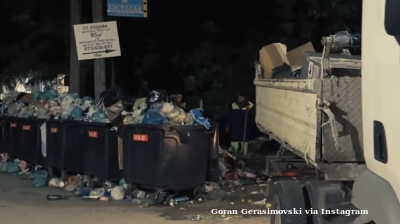Macedonia has made substantial progress towards membership in the European Union, but needs to complete key reforms by the end of this year in order to start accession talks with the bloc, EU Commissioner for Neighbourhood Policy Johannes Hahn said on November 20.
Macedonia has been an EU candidate country since 2005, and has received eight positive recommendations to launch EU accession talks. However, its progress has long been stalled due to the lack of reforms in recent years and the unresolved name dispute. Still, a new study shows that out of the current EU candidate states, only Macedonia is projected to meet the accession criteria by 2023.
Hahn arrived for two-day visit in the Western Balkan country to an extremely warm welcome from the new government. Officials are seeking to reactivate progress towards EU accession, which had long been stalled under the previous government and during the recent political upheavals in the country.
“What is important now is the government and other relevant institutions to focus on laws and conditions that should be met to get recommendation,” Hahn said at a joint press conference in Skopje with Macedonian Prime Minister Zoran Zaev.
The EU commissioner praised Macedonia for achieved progress so far and said he was confident that EU member states will give a positive recommendation for the launch of accession talks.
Macedonia needs to complete reforms of the intelligence services, the judiciary and the public administration by the end of this year in order to get positive recommendation for the start of accession talks.
The country should also resolve the so-called name dispute with Greece, which objects to the use of the name "Macedonia" as it has a northern province with the same name. The longstanding issue is blocking Macedonia's bid to join Nato and the EU, but the new government in Skopje has been trying to reach an agreement with Greece.
In addition to Zaev, Hahn met with other top Macedonian officials including Deputy Prime Minister for European Affairs Bujar Osmani and parliament speaker Talat Xhaferi.
The enthusiasm for Macedonia’s progress towards the EU was also signalled in a warm exchange of tweets between Hahn and Macedonian officials.
“I came to #Skopje to acknowledge the progress made and to support further reforms which will allow us to present a clear #recommendation to open negotiations,” wrote Hahn on the micro-blogging platform.
“Good meeting with PM @Zoran_Zaev and government representatives in #Skopje. Commend reform efforts, must be further stepped up, so we can make next steps on #EU path,” he added.
“Your presence represents incentive towards reforms, catalyst in the process of creating consensus, as well as support for the overall #EUintregration process of [Macedonia],” commented Osmani.
Hahn also had a message for the opposition, and met with leaders from the conservative VMRO-DPMNE party, which went into opposition in May after a decade in power.
He stressed that it was important the opposition “plays its role” and is “responsible”, while criticism should be “constructive”.
“If its about a national goal — the euro Atlantic perspective of the country — … this can only be achieved if everyone is pulling on the same string in the same direction. I urge in particular all opposition parties to play their role,” he commented at the press conference.
News

Pokrovsk update: Russia controls half the city in a chaotic battle
The battle for Pokrovsk is raging and the Armed Forces of Russia (AFR) have captured half the city, but the situation is very confused. Reports from the city say there is no frontline as the Russians are using a “Brownian motion” tactic.

Singapore introduces new law on caning with harsher penalties to combat scammers
Singapore has passed a new criminal law that mandates caning as part of the punishment for scam-related crimes, following a surge in financial fraud that has cost the nation nearly $4bn over the past six years.

Foreign companies pay Russia $60bn in taxes since Ukraine invasion
Foreign companies in Russia paid at least $20bn in taxes in 2024 alone, and cumulative tax payments since early 2022 exceed $60bn.

 Cropped.jpg)


